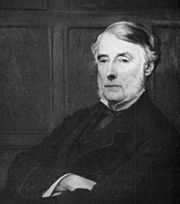James Hack Tuke
| James Hack Tuke | |
|---|---|
 | |
| Born |
13 September 1819 York, Yorkshire |
| Died | 13 January 1896 (aged 76) |
| Occupation | philanthropist, businessman |
James Hack Tuke (13 September 1819 – 13 January 1896) was born at York, England, the son of Samuel Tuke.[1]
He was educated at the Religious Society of Friends school there, and after working for a time in his father's wholesale tea business, became in 1852 a partner in the banking firm of Sharples and Co., and went to live at Hitchin in Hertfordshire.
For eighteen years he was treasurer of the Friends Foreign Mission Association, and for eight years chairman of the Friends Central Education Board. But he is chiefly remembered for his philanthropic work in Ireland, which was in a great measure the result of a visit to Connaught In 1847, and of the scenes of distress which he there witnessed. In addition to relief, his eye-witness testimony proved invaluable in bringing further relief to the west of Ireland [2] In 1880, accompanied by WE Forster, he spent two months in the West of Ireland distributing relief which had been privately subscribed by Friends in England.
Letters descriptive of the state of things he saw were published in The Times, and in his pamphlet, Irish Distress and its Remedies (1880), he pointed out that Irish distress was due to economic rather than political difficulties, and advocated state-aided land purchase, peasant proprietorship, light railways, government help for the fishing and local industries, and family emigration for the poorest peasants. From 1882 to 1884 he worked continuously in Ireland superintending the emigration of poor families to the United States and the Colonies.
The failure of the potato crop in Ireland in 1885 again called forth Tuke's energy, and on the invitation of the government, aided by public subscription, he purchased and distributed seed potatoes in order to avert a famine. To his reports of this distribution and his letters to The Times, which were reprinted under the title The Condition of Donegal (1889), were due in a great measure the bill passed for the construction of light railways in 1889 and the Irish Land Act which established the Congested Districts Board in 1891.
See Report of the Select Committee of the House of Commons (1815–1816); Dr Conolly, Treatment of the Insane without Mechanical Restraints (1856); Dr Hack Tuke, Chapters in the History of the Insane in the British Isles (1882).
References
![]() This article incorporates text from a publication now in the public domain: Chisholm, Hugh, ed. (1911). Encyclopædia Britannica (11th ed.). Cambridge University Press
This article incorporates text from a publication now in the public domain: Chisholm, Hugh, ed. (1911). Encyclopædia Britannica (11th ed.). Cambridge University Press
|